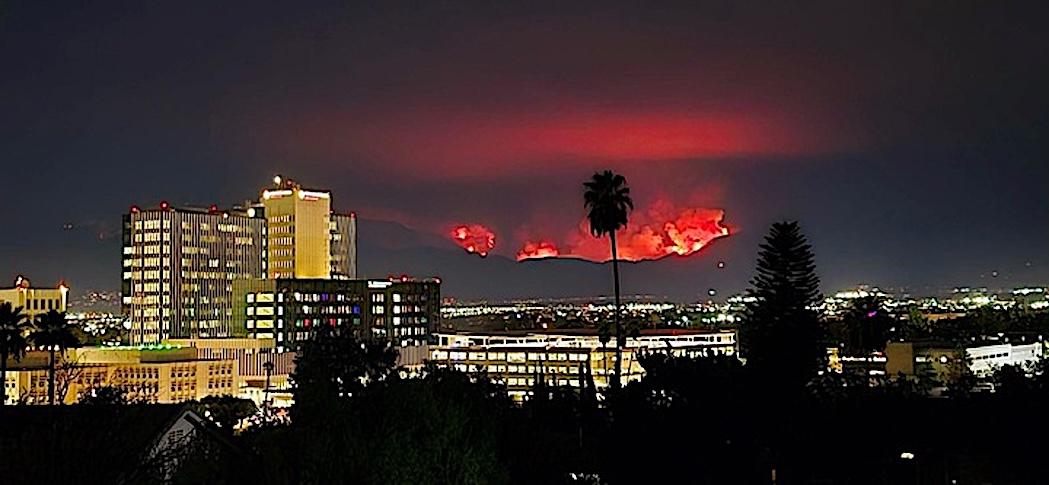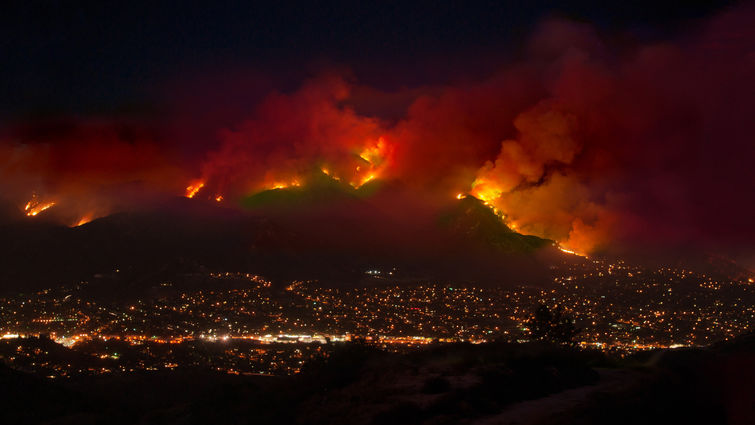

Southern California wildfires have already impacted over 200,000 residents in 2025
Wildfires are devastating events that not only cause physical destruction but can take a significant toll on the mental health of residents, first responders, and surrounding communities. Wildfires, which can last anywhere from a few days to several weeks, cause not only physical destruction but also emotional trauma from fear of evacuation, loss of life, and exasperated health concerns.
The trauma associated with natural disasters, such as wildfires, is classified as a Big “T” Trauma, meaning the event is severe enough to overwhelm a person’s ability to cope due to its life-threatening nature. “People often report vivid images or sounds they cannot get out of their minds,” says Samuel Martinez, LCSW, Outpatient Psychotherapist. “These sensory experiences can become lasting triggers, affecting individuals long after the event.”
While the devastating impact of wildfire affects everyone differently, Martinez acknowledges the following mental health symptoms associated with such an event:
-
Acute stress
-
High hypervigilance
-
Difficulty sleeping
-
Difficulty eating
-
Anxiety
-
Feelings of overwhelm
-
Mood swings
-
Grief
-
PTSD
Since the impact of a wildfire differs based on individual experiences, Martinez outlines different strategies for addressing mental health concerns among various groups.
Individuals directly impacted by a fire
For an individual who has lost a home, property, business, or belongings to a fire, the immense roller coaster of emotions and stress levels can be overwhelming and can even feel unbearable. Some might be ready to discuss the trauma of losing their home to a fire, while others might not be able to bridge the topic right away. Martinez stresses the importance of gauging readiness to talk about the trauma.
For someone ready to engage in conversation about the event, Martinez recommends “top-down processing,” a strategy that helps a person sort through their emotions in a safe environment. Those who aren’t ready to discuss the event might need a “bottom-up” approach, which focuses on helping them reconnect with their bodies through grounding exercises, including diaphragmatic breathing, to calm the nervous system and stabilize the body’s stress response.
Survivor’s guilt
If an individual’s house remained untouched by fire while their neighbor’s house burned down, they might experience survivor’s guilt –– guilt or sadness associated when one's property remains untouched while a neighbor suffers loss. It’s possible to feel survivor’s guilt while also feeling grateful for having been spared the worst of the tragedy.
“If you are feeling survivor’s guilt, it’s important to acknowledge those feelings while also recognizing that your pain is real, even if it isn’t as severe as someone else’s, “Martinez says. “Two truths can coexist: You can grieve your loss and be grateful for your safety at the same time. It doesn’t make you a bad person.”
For those suffering from survivor’s guilt, Martinez recommends treatments like cognitive behavioral therapy or dialectical behavior therapy, methods that help individuals manage their intense emotions.

Evacuation anxiety
Fire evacuation anxiety can be overwhelming, especially when you are on standby. Martinez says that while it’s essential to stay packed, prepared, and vigilant, it's also okay to find ways to manage stress and stay calm.
“Staying alert doesn’t mean you have to be in constant fight-or-flight mode,” he says. “Taking deep breaths and grounding yourself in the present can help prevent escalating fear about events that haven’t occurred yet while ensuring you take the situation seriously enough to be ready when needed.”
Additionally, finding healthy distractions during this period of uncertainty is crucial, such as talking to family and friends, engaging in hobbies, watching TV, or playing games. These sorts of distractions help the mind and body take breaks, which can help manage anxiety and respond more effectively if action is required.
Indirectly affected individuals
Witnessing community devastations can cause severe emotional strain. Martinez suggests getting involved in meaningful ways, such as donating or participating in community initiatives that give back to victims.
“You don’t have to be physically there to make an impact,” he urges. “Find local businesses or big organizations that are providing immediate relief and donate resources to help those impacted.”
PTSD associated with wildfires
As individuals move forward, they might start to struggle with flashbacks, disassociation, a heightened sense of danger, or physical symptoms such as an increased heart rate. Post-traumatic stress disorder (PTSD) can make it challenging to move forward in a healthy way. For anyone with warning signs of PTSD, Martinez recommends seeking professional help.
“At the Behavioral Medical Center, we offer several tools to help in these types of situations,” Martinez says. “We use eye movement desensitization and reprocessing therapy as the golden standard of care for trauma. We also have the Community Resilience Model, which teaches techniques to help you reconnect with your body, especially if you're struggling with dissociation."
The mental health impact of wildfires can be profound, affecting individuals at various levels of proximity to the disaster. To get started with professional help, visit our website or call us at 909-558-9275.



